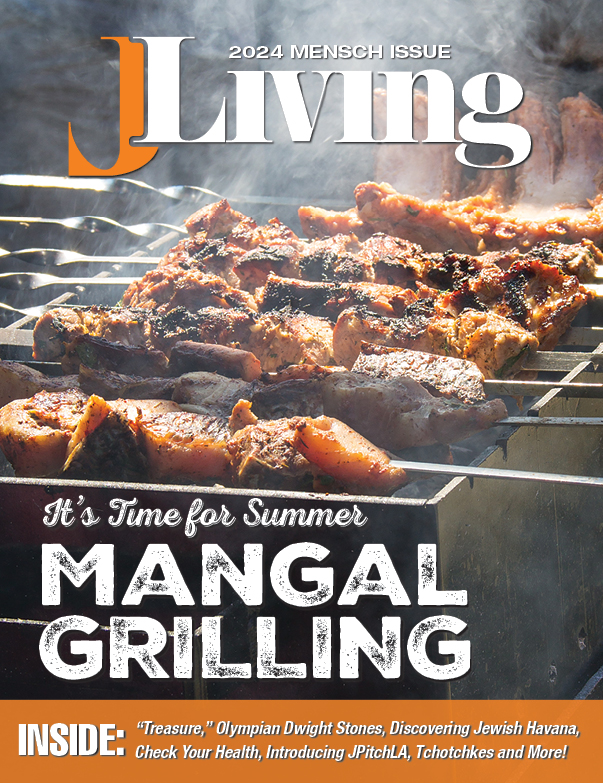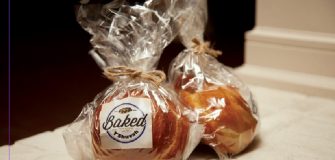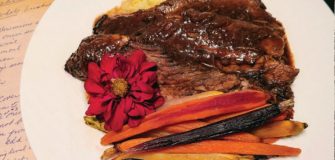NOSH with Micah Siva
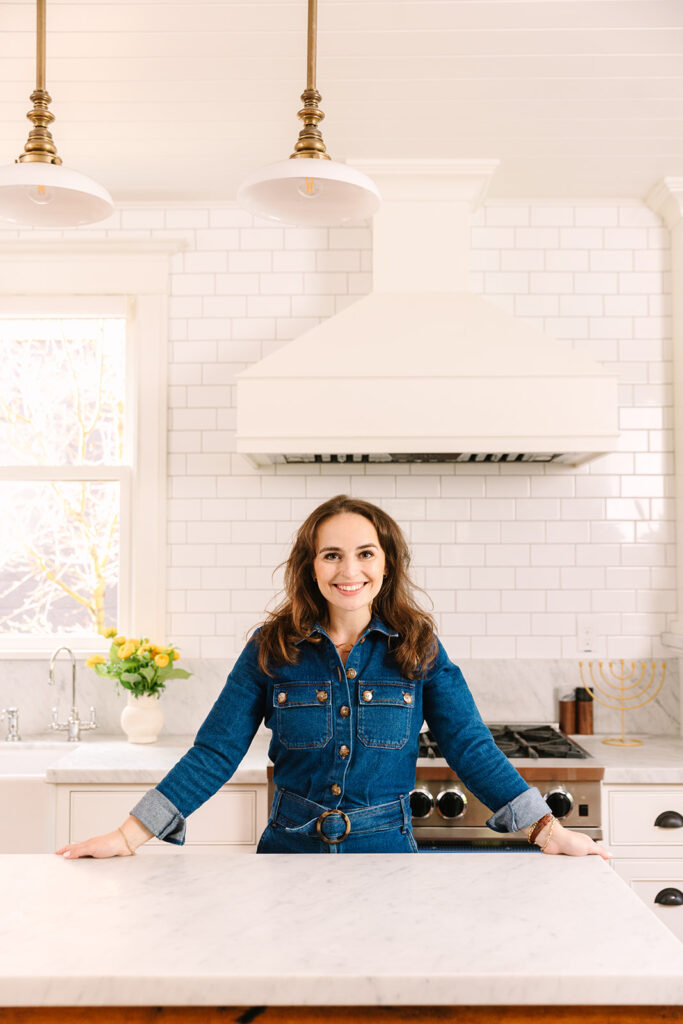
You don’t have to be vegetarian to enjoy vegetarian food,” believes author Micah Siva, a trained chef, registered dietitian, recipe writer and food photographer. “Many of the foods that everyone knows and loves [for example, French fries] are vegetarian or vegan.”
Siva, aka Nosh with Micah, serves up vegetarian food with Jewish influence in her debut cookbook, NOSH: Plant-Forward Recipes Celebrating Modern Jewish Cuisine, out March 5.
“Plant forward,” she writes in the book, is “a way of cooking and eating that emphasizes plant-based foods without limiting one’s diet to being vegetarian or vegan. This book is meant for anyone who follows a plant-based diet or is looking to adopt a plant-forward way of eating.”
Featuring more than 80 plant-based Jewish cuisine recipes, Nosh is a much-needed addition to a foodlovers cookbook shelf. Siva brings together her love for cooking, her commitment to a health-supportive way of eating, and her devotion to her Jewish heritage.
“I’ve always felt like there was just like a gap in the market, having been vegetarian, and on and off vegan since I was around 12,” she says.
After graduating from the Natural Gourmet Institute for Health & Culinary Arts, Siva pursued a career in nutrition and later worked for global brands, media outlets and publications in food media. Siva and her husband, Joshua, co-wrote 1, 2, 3, Nosh with Me, an illustrated children’s book about Jewish foods and their meanings.
Whenever Siva looked for connection to community, she went back to Jewish food. The only problem was that the foods she grew up eating, made by her bubbes or her mom, weren’t anything she would eat anymore.
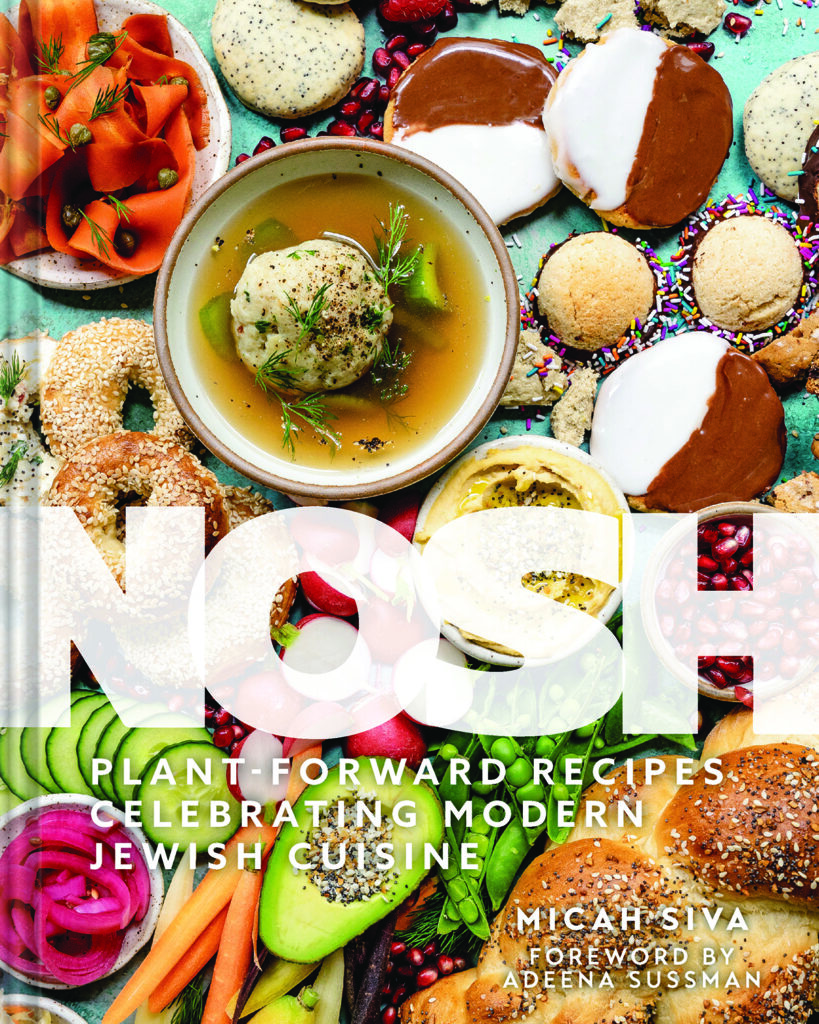
“I’d always been looking for ways to celebrate my heritage and the culture through food, but in a way that felt like it was something I actually wanted to eat,” she explains. “I felt like it was important that I use my platform to be more vocally Jewish, and connect to Judaism through that.”
A few years ago, Siva noticed more and more vegan and vegetarian cookbooks coming out for every cuisine, including Korean, Indian and Japanese.
“I thought, ‘Why isn’t there one for Jewish people?’” she says. “And with the trends of how people are eating now, and environmental concerns and health concerns, it felt like it was a natural fit.”
Nosh offers plant-forward options anyone can enjoy, again with a Jewish twist. This means carrot “lox,” kasha and mushroom cabbage rolls, and spiced cauliflower chraime (spicy stew from North Africa), along with soups, salads, drinks and desserts.
“I grew up Ashkenazi, my husband is Sephardic,” she says. “We get a little bit of both in the cookbook.”
There’s also a handy Jewish food glossary, from Amba to Zhoug, as well as sample holiday and everyday menus; recipes for pantry and fridge essentials; historical and cultural tidbits; and helpful hints. Siva also includes plant-based substitutions for dairy items and eggs, as well as gluten-free and Passover-friendly options.
At the beginning of the year, people tend to be more health-conscious. Frequently that resolve fades away.
“I think the biggest thing that causes people to fall off is making too many changes at once,” Siva says. “We have to make small changes that we can see through for a long time, and we can see that they can fit into our life.”
She adds, “Finding ways to make your vegetables delicious is the best way to be more motivated to eat them.”
Going “cold turkey” (maybe pun intended) on meat doesn’t serve anyone. It’s hard to maintain.
“I always, as a dietician, have said that the best thing we can do is add to our diet, not take something away,” she says. “It’s important to note that the book isn’t prescribing a vegan diet. It isn’t prescribing anything. It’s just suggesting that you try something different and look at vegetables [and] vegetarian food in a different way.”
According to Siva, the real key is to just start adding more vegetables and fruits into your diet. “You don’t have to be vegan,” she says. “You don’t have to be vegetarian, but we can all probably stand to add a couple more veggies into our daily life.”
And if you are tempted to fall off the plant-based wagon, remind yourself why eating well is important to you, whether it’s for your kids, your partner, yourself, or all of the above.
To whet your appetite for a plant-forward menu, here’s a taste of some of Siva’s recipes.
Her pomegranate lentil tabbouleh is a grain-free tabbouleh salad that uses lentils in place of bulgur wheat for plant-based protein.
When she was writing the book, Siva looked at the dishes objectively and asked herself, ‘If this was the only thing that you had at a potluck, would it satisfy you as a full meal?’
To that end, so many of her dishes contain beans or different vegetarian proteins, so the answer would be a resounding, “Yes!”
There’s a lot of chickpeas, white beans and lentils in there. This dish has pomegranate seeds, za’atar and then a somewhat classic tabbouleh dressing.
“I love that you can make it in advance,” Siva says. “It can be stored in the fridge for up to three or four days.”
You can add grilled tofu. Those who don’t eat vegetarian can include a protein such as grilled chicken or fish.
“It’s a really versatile dish that most people love, and especially with the addition of pomegranate for just something a little bit different.”
Siva’s fennel and beet borscht is inspired by her grandmother.
“Eating borscht reminds me of my grandmother,” she says. “She used to make it with meat, and then it took me many years to work with her to make a vegetarian version for me.
“Growing up in Canada, winter is 10 months of the year, and beets are always in season,” Siva adds. “This is more or less my ode to her Borscht, but with a little bit of a twist with the fennel.”
For dessert, Siva shares her kitchen sink mandelbrot.
“They’re almost like biscotti,” she explains. “I love this one because it’s a very modern take with the ‘kitchen sink.’”
For Siva, the kitchen sink means adding pretzels, potato chips, cinnamon, ground coffee, chocolate, chips, and flaky sea salt on top.
“My other grandmother was a terrible cook,” Siva explains. Her mandelbrot, or komishbrot, as they called it, was the one thing she could make.
“I took the recipe that she’d been using for decades and made it a little bit more funky and sweet and salty with the additions of pretzels and potato chips and whatnot,” she continues. “It’s just a really fun cookie that is a little too easy to eat.”
Siva says her love of cooking came from her maternal grandmother; the one who inspired the borscht recipe.
“I grew up in the kitchen with my grandma or my mom, just cooking together,” she recalls.
When Siva became vegetarian, her mom was always saying that she didn’t want to make two meals.
“I really started to make a lot of the food for our family,” she says. “I just fell in love with it to the point [that] in high school I would host dinner parties for 30 of my friends once a month, making full meals like Thanksgiving dinners and holiday dinners.”
Necessity turned into a passion, one Siva is happily sharing.

